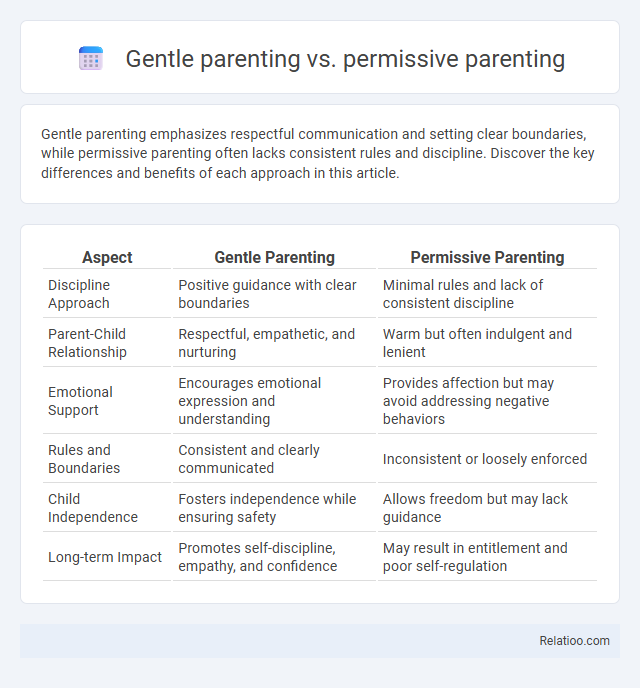Gentle parenting emphasizes respectful communication and setting clear boundaries, while permissive parenting often lacks consistent rules and discipline. Discover the key differences and benefits of each approach in this article.
Table of Comparison
| Aspect | Gentle Parenting | Permissive Parenting |
|---|---|---|
| Discipline Approach | Positive guidance with clear boundaries | Minimal rules and lack of consistent discipline |
| Parent-Child Relationship | Respectful, empathetic, and nurturing | Warm but often indulgent and lenient |
| Emotional Support | Encourages emotional expression and understanding | Provides affection but may avoid addressing negative behaviors |
| Rules and Boundaries | Consistent and clearly communicated | Inconsistent or loosely enforced |
| Child Independence | Fosters independence while ensuring safety | Allows freedom but may lack guidance |
| Long-term Impact | Promotes self-discipline, empathy, and confidence | May result in entitlement and poor self-regulation |
Understanding Gentle Parenting
Gentle parenting emphasizes empathy, respect, and clear communication to nurture emotional intelligence and secure attachment in children, contrasting sharply with permissive parenting which often lacks consistent boundaries and discipline. Unlike power struggles that escalate conflict between parent and child, gentle parenting seeks to prevent these confrontations by addressing the child's needs and feelings constructively. This approach promotes long-term positive behavior through guidance rather than control, supporting healthy development and mutual trust.
Defining Permissive Parenting
Permissive parenting is characterized by high responsiveness and low demandingness, where parents are indulgent and avoid setting firm boundaries or enforcing consistent rules. This style often leads to children developing poor self-discipline and may contribute to behavioral issues due to lack of structure. In contrast, gentle parenting emphasizes empathy and guidance without harsh discipline, while power struggles arise when parents use forceful control tactics, resulting in conflict and resistance from children.
Key Differences Between Gentle and Permissive Parenting
Gentle parenting emphasizes empathy, respect, and setting clear, consistent boundaries, while permissive parenting tends to lack firm limits and permits children to self-regulate without much guidance. Gentle parenting fosters emotional intelligence and mutual understanding, contrasting with permissive parenting's focus on avoiding conflict, which can lead to behavioral issues. Power struggles often arise from authoritarian demands or inconsistent boundaries, whereas gentle parenting seeks to minimize these conflicts through compassionate communication.
Core Principles of Gentle Parenting
Gentle parenting centers on empathy, respect, and understanding, fostering a nurturing environment that prioritizes emotional connection and positive communication. Unlike permissive parenting, which often lacks boundaries and discipline, gentle parenting balances firmness with kindness, promoting self-regulation and cooperation without power struggles. Avoiding control battles, gentle parenting emphasizes guidance over punishment, encouraging children's autonomy while maintaining consistent, compassionate limits.
Characteristics of Permissive Parenting
Permissive parenting is characterized by high responsiveness and low demands, where parents are nurturing and communicative but often avoid setting firm boundaries or enforcing consistent rules. This style can lead to power struggles as children may exploit the lack of structure, challenging parental authority and creating conflicts. Your ability to maintain a balanced approach is crucial to prevent permissive parenting from undermining your child's development of self-discipline and respect for limits.
Emotional Outcomes for Children
Gentle parenting fosters emotional security by emphasizing empathy, active listening, and clear boundaries, which helps children develop self-regulation and resilience. Permissive parenting often leads to emotional challenges, including increased anxiety and poor impulse control, due to a lack of consistent limits and guidance. Power struggles, commonly arising from authoritarian approaches, negatively impact emotional outcomes by creating stress, reduced self-esteem, and impaired social competence in children.
Discipline Styles: Gentle vs Permissive
Gentle parenting emphasizes empathy, respect, and understanding, promoting positive discipline through clear communication and emotional support, whereas permissive parenting often lacks firm boundaries and consequences, resulting in inconsistent discipline. Power struggles frequently arise in permissive approaches due to unclear limits, whereas gentle parenting reduces conflict by fostering cooperation and mutual trust. Effective discipline balances guidance with warmth, preventing power struggles and encouraging long-term behavioral growth.
Long-Term Effects on Child Development
Gentle parenting fosters secure attachment and emotional regulation, promoting resilience and social competence in children. Permissive parenting often leads to poor self-discipline and increased risk of behavioral problems due to lack of boundaries. Your understanding of these approaches can help avoid power struggles that undermine authority and negatively impact long-term child development.
Common Misconceptions About Gentle Parenting
Gentle parenting is often mistaken for permissive parenting due to its emphasis on empathy and respect, but it maintains consistent boundaries and discipline focused on guidance rather than punishment. Unlike permissive parenting, which may lack firm limits, gentle parenting encourages emotional regulation and connection to prevent power struggles between parent and child. Misconceptions also arise when gentle parenting is viewed as passive or weak, whereas it actively fosters secure attachment and long-term behavioral growth.
Choosing the Right Approach for Your Family
Gentle parenting emphasizes empathy and respect, fostering a positive parent-child bond, while permissive parenting often lacks consistent boundaries, potentially leading to behavioral challenges. Power struggles arise when authority is contested, causing tension and undermining effective communication. Selecting the right approach involves assessing your child's temperament, family values, and long-term goals to create a balanced, nurturing environment that promotes cooperation and emotional growth.

Infographic: Gentle parenting vs Permissive parenting
 relatioo.com
relatioo.com